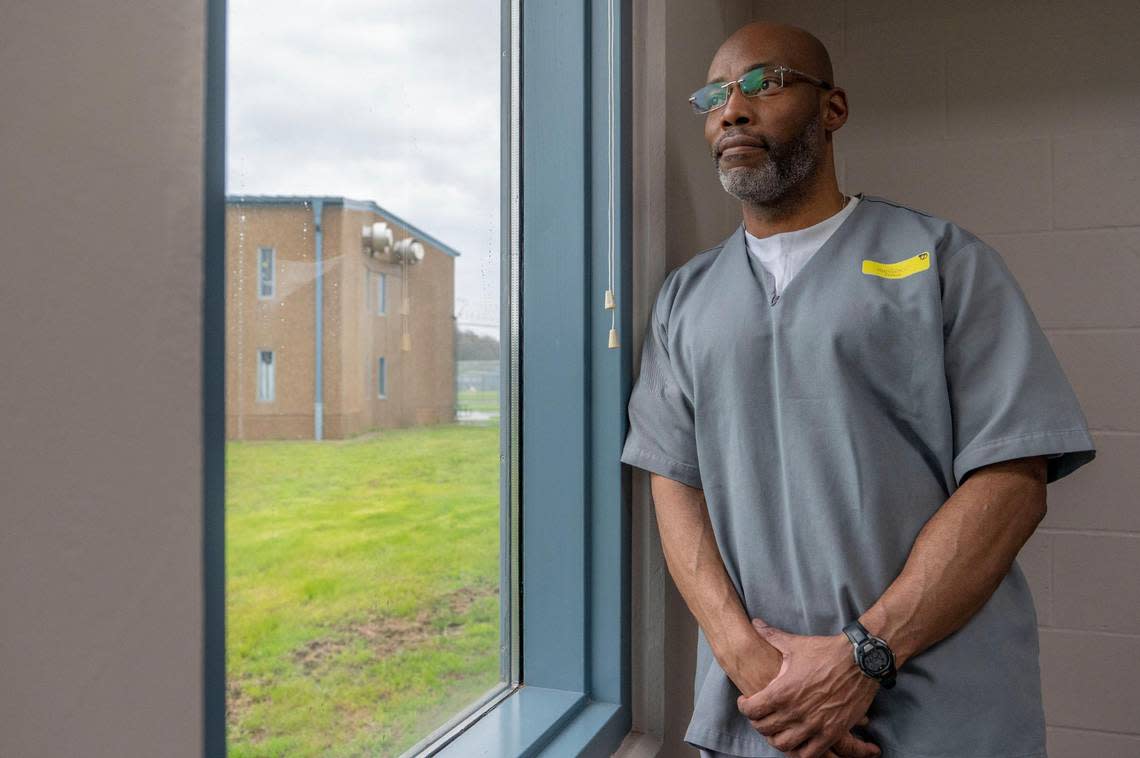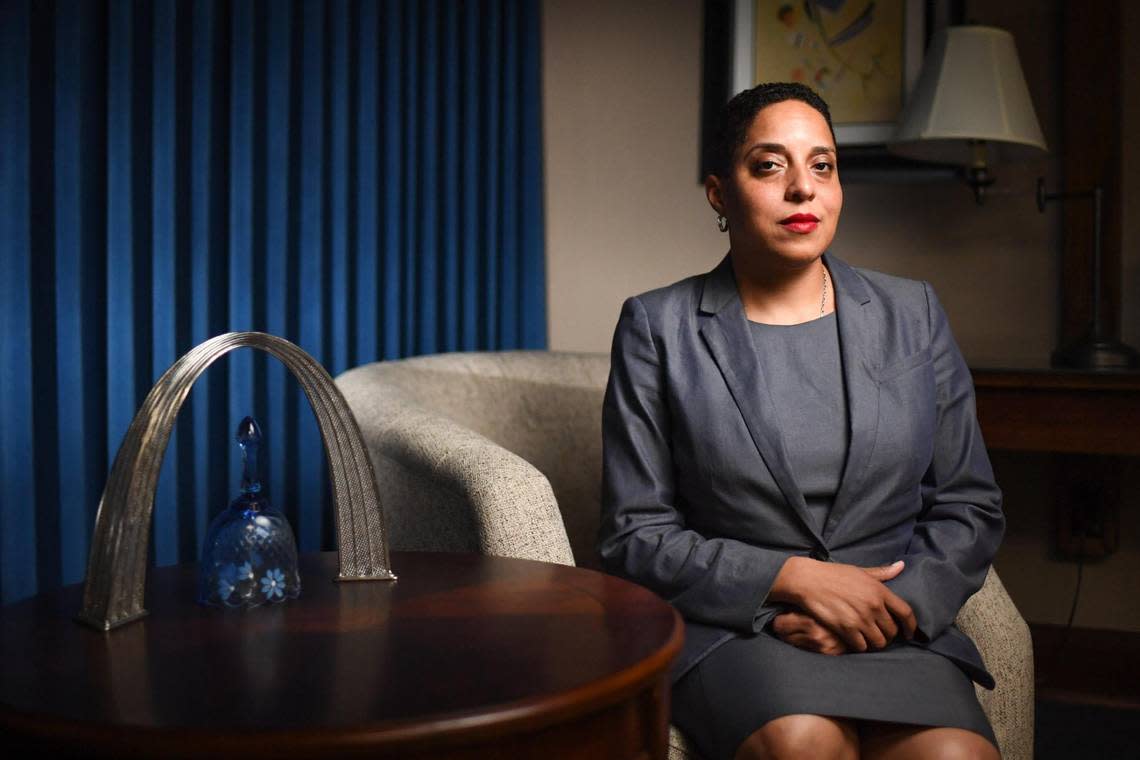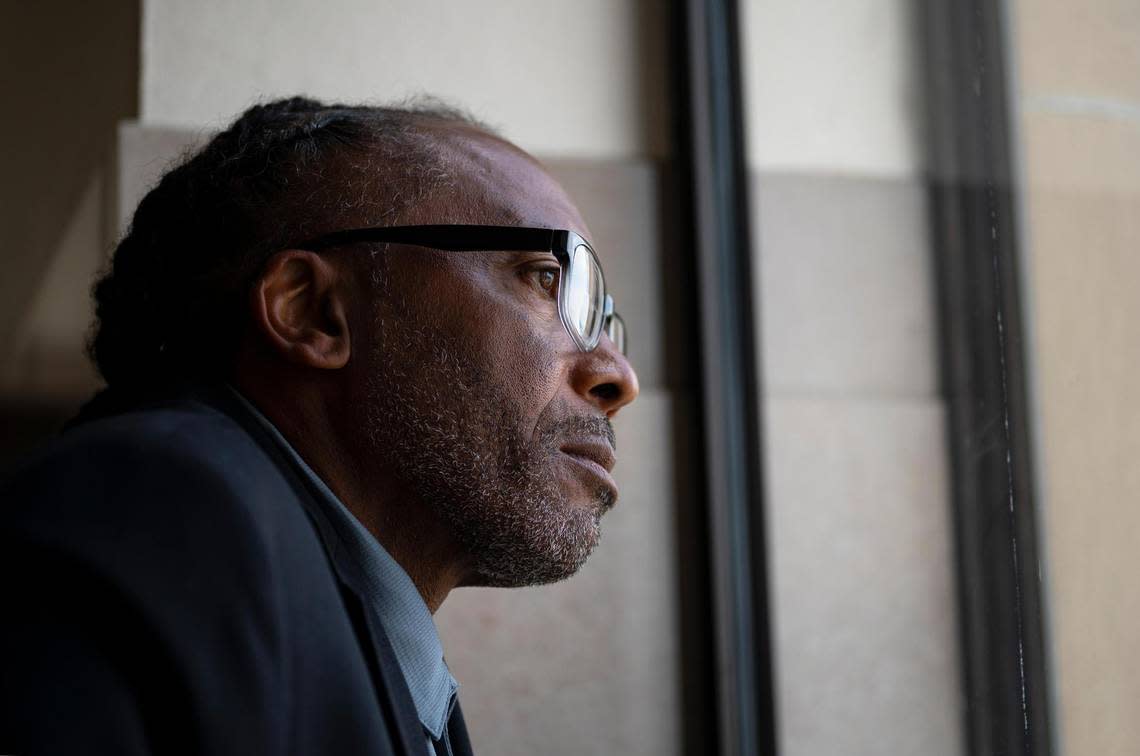Missouri prosecutor seeks to free Lamar Johnson, says he is innocent in 1994 murder
St. Louis’ top prosecutor filed a motion Wednesday seeking to free Lamar Johnson, who she says has spent more than 27 years in prison for a murder he did not commit.
Circuit Attorney Kim Gardner is seeking a hearing during which her office will present evidence and ask a judge to exonerate Johnson, now 48. He has been imprisoned for more than half of his life for a 1994 murder that two other men have confessed to committing.
Gardner’s motion is the third filed under a Missouri law that allows local prosecutors to petition a court in an effort to exonerate prisoners they have determined were wrongly convicted. The law, which went into effect in 2021, gave Jackson County prosecutors a path to help free Kevin Strickland, a Kansas City man who spent 42 years in prison for a triple murder he did not commit.
“We hope that today’s detailed motion marks the beginning of the end of Lamar’s road to freedom,” Johnson’s attorneys said in a statement. “We have long said the truth always finds a way, and that Lamar only needed a chance to tell it. The time has finally come.”
The Missouri Attorney General’s Office has argued Johnson is guilty and called his evidence of innocence “not compelling.” The office did not immediately respond Wednesday to a request for comment.
Then 21, Johnson was convicted in 1995 of first-degree murder and armed criminal action in the Oct. 30, 1994, nighttime shooting of 25-year-old Marcus Boyd, who was found on the porch of a brick home in St. Louis’ Dutchtown neighborhood. Johnson was sentenced to life in prison without the possibility of parole.
At the urging of Johnson’s lawyers, Gardner’s conviction integrity unit in 2018 started reviewing his case. The next year, she released a report detailing how her office determined Johnson “had nothing to do with Boyd’s murder.”

For more than two decades, Gardner’s office said, Johnson’s co-defendant, Phillip Campbell, and another man, James Howard, credibly confessed to shooting Boyd alone and provided a motive. Campbell, who pleaded guilty after Johnson was convicted, got a seven-year sentence. Howard, who was not charged in Boyd’s killing, is in prison for a homicide committed three years later, in 1997.
“Lamar Johnson was not involved in the death of Marcus Boyd,” Howard wrote in a 2009 affidavit. “I know Lamar Johnson is innocent of that crime because I was there and Lamar Johnson was not there.”
Gardner’s office also said it found “widespread falsification of witness statements” by St. Louis detectives and egregious prosecutorial misconduct throughout the case. The only eyewitness to the shooting, for example, was paid more than $4,000 by prosecutors to identify Johnson, her office said. He recanted his testimony as early as 2003, saying he did not actually see the faces of the two gunmen.
Calling Johnson’s incarceration a “miscarriage of justice,” Gardner in 2019 filed a motion for a new trial. But before the passage of the new law, the Missouri Supreme Court ruled that Gardner did not have the power to overturn a wrongful conviction decades later.
His lawyers have since been trying to free him another way in Cole County, where he remains imprisoned at the Jefferson City Correctional Center. A hearing in that case, during which Johnson is set to present new evidence, is scheduled for December. But Gardner’s motion could prove a faster route to exonerate Johnson if she can convince a judge he is innocent.
Earlier this year, Johnson told The Star he did not understand how, after years of investigation, he still had not received a day in court to lay out his new evidence. If he is freed, he plans to care for his ailing mother and see the ocean for the first time.
“I don’t need a lot,” Johnson said. “I just need my life, my freedom.”
A Star report detailed how the questionable testimony of a repeat jailhouse informant — who was described as a violent racist with a swastika tattoo — helped prosecutors convict Johnson, who is Black. The informant, William Mock, claimed to have heard Johnson confess to the killing while in jail, but his story, Gardner determined more than two decades later, “was and is not credible.”

Gardner’s office also found that her predecessors failed to disclose Mock’s vast criminal record to Johnson’s lawyers at trial as well as his history as an incentivized jailhouse informant. He had claimed two years earlier — under “bizarrely similar circumstances,” Gardner noted — to have heard a fellow cellmate in Jackson County confess to a double homicide in Kansas City.
The motion is a significant step in Johnson’s efforts to prove his proclaimed innocence. Conviction integrity units within prosecutors’ offices have contributed to righting dozens of injustices in recent years as they work with innocence projects. Across the nation, such units have played a role in 647 exonerations, according to the National Registry of Exonerations.
The Star’s reporting on Strickland’s case has been credited with pushing lawmakers to pass the legislation that now allows Gardner to try to overturn Johnson’s convictions.
The state’s first motion to dismiss under the law was filed by Jackson County Prosecutor Jean Peters Baker. It led to the November release of Strickland, who endured Missouri’s longest known wrongful imprisonment.
Strickland’s release came after Baker’s contentious, months-long legal battle with the Missouri Attorney General’s Office, which argued Strickland was guilty. Post-conviction lawyers feared that the AG’s opposition to Baker’s motion would send a chilling message to other local prosecutors, especially ones overseeing offices with fewer resources.

Then in May, Joshua Hedgecorth, the prosecutor in Washington County in eastern Missouri, filed the second motion in the hopes of throwing out the conviction of Michael Politte, who was paroled in April after serving 23 years in prison for a murder he maintains he did not commit. Among other problems with the case, the only physical evidence that connected Politte to his mother’s killing has been scientifically proven false, Hedgecorth wrote in court filings.
Lawyers and activists have also urged Gardner to seek to overturn the conviction of Chris Dunn, who remains in prison even though a judge in 2020 agreed a jury would now likely find him innocent of a 1990 murder in St. Louis.
The judge, William Hickle, declined to exonerate Dunn because he is not on death row. Legal precedent in Missouri restricts freestanding innocence claims — ones made without constitutional violations — to prisoners who have been sentenced to die. It meant Dunn may have been freed had he been awaiting execution, as opposed to his sentence of life in prison plus 90 years.
Gardner told The New Republic, which published an in-depth story on Dunn’s situation in June, that she intends to take on his case.
